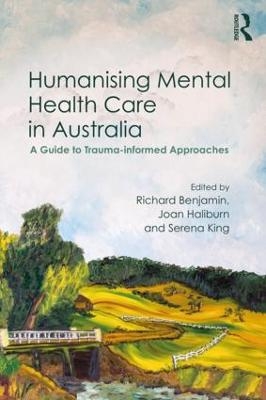
Humanising Mental Health Care in Australia
Routledge (Verlag)
978-0-367-07660-3 (ISBN)
Humanising Mental Health Care in Australia is a unique and innovative contribution to the healthcare literature that outlines the trauma-informed approaches necessary to provide a more compassionate model of care for those who suffer with mental illness. The impact of abuse and trauma is frequently overlooked in this population, to the detriment of both individual and society. This work highlights the importance of recognising such a history and responding humanely.
The book explores the trauma-informed perspective across four sections. The first outlines theory, constructs and effects of abuse and trauma. The second section addresses the effects of abuse and trauma on specific populations. The third section outlines a diverse range of individual treatment approaches. The final section takes a broader perspective, examining the importance of culture and training as well as the organisation and delivery of services.
Written in an accessible style by a diverse group of national and international experts, Humanising Mental Health Care in Australia is an invaluable resource for mental health clinicians, the community managed and primary health sectors, policy makers and researchers, and will be a helpful reference for people who have experienced trauma and those who care for them.
Dr Richard Benjamin is a public sector psychiatrist and psychotherapist. He is particularly interested in the long-term effects of child abuse, their manifestations in adults presenting with mental illness, and the benefits of incorporating an understanding of both trauma and relationship in therapeutic responses. Dr Joan Haliburn is a child, adolescent and family psychiatrist and psychotherapist. She is also a Lecturer at the University of Sydney, Australia. She is the former President and Director of Training of the Australian and New Zealand Association of Psychotherapy (ANZAP) and a member of the board of the International Society for the Study of Trauma and Dissociation (ISSTD). Serena King is a clinical psychologist. She has worked extensively in community mental health and the tertiary education sector. She has held senior roles as a clinician, manager, supervisor and training provider. She has a particular interest in trauma-informed and relational treatments when working with clients with complex mental health issues. She facilitates multidisciplinary training in trauma-informed and psychotherapeutic approaches.
A Plea About the Editors List of Contributors Acknowledgments Editors’ Notes Foreword Peter McClellan, AM, QC Introduction Richard Benjamin Part 1: Theory and Constructs 1. Trauma Theory Sandra Bloom 2. The Interpersonal Construction of the Human Brain-Mind System Russell Meares 3. Childhood Trauma - The Long-Term Impact and the Human Cost Cathy Kezelman 4. The Relationship Between Child Maltreatment, Inequalities and Later Health Outcomes Jackie Amos and Leonie Segal 5. Adult Trauma and Posttraumatic Stress Disorder - Contemporary Concepts Alexander C McFarlane 6. Complex Post-Traumatic Stress Disorder, Developmental Trauma Disorder, Borderline Personality Disorder, and the Dissociative Disorders Martin Dorahy and Mary-Anne Kate Part 2: Specific Populations 7. Trauma-Informed Care in Infancy Louise Newman 8. Institutional Abuse of Children - An Australian Perspective Carolyn Quadrio 9. Incest That Continues into Adult Life Warwick Middleton 10. Aboriginal Australia - Trauma Stories Can Become Healing Stories if we Work with Therapeutic Intent Judy Atkinson 11. The Mental Health of Refugees and People Who Seek Asylum Derrick Silove and Sarah Mares 12. Humanising Responses to People Who Have Experienced Sexual Violence Jackie Burke 13. Recognising and Understanding the Experience of Trauma in the Context of Domestic Violence Agi O’Hara 14. Trauma-Informed Care in The Context of Alcohol and Other Drug Use Disorders Katherine Mills and Maree Teesson 15. Biology and Experience Intertwined - Trauma, Neglect and Physical Health Johanna Lynch and Anna Luise Kirkengen Part 3: Individual Treatment Approaches 16. Sequenced Relationship-Based Treatment for Complex Traumatic Stress Disorders Christine A Courtois and Julian D Ford 17. Treating Posttraumatic Stress Disorder with Evidence-Based Psychological Treatments Carla J Walton and Christopher W Lee 18. Trauma-Informed Psychodynamic Psychotherapy - A Brief History and Contemporary Application Joan Haliburn 19. Working with Body and Mind - Trauma-Informed Somatic Psychotherapy Marianne Kennedy and Narelle McKenzie 20. Meditation and Yoga for Trauma Timothea Goddard 21. Structured Therapy Versus Psychodynamic Therapy Nick Bendit 22. Working with Trauma - Implications for Supervision and Professional Ethics Elisabeth Shaw Part 4: Organisational Approaches 23. The Pillars of Trauma-Informed Care and The Need for Cultural and Organisational Change Pam Stavropolous 24. Therapeutic Services for Traumatised Children and Young People – Healing in The Everyday Experience of Relationships Joe Tucci and Janise Mitchell 25. Setting Up A Whole of Culture Trauma-Informed Care Model in Australia Matthew Spicer and Veronica Burton 26. The Trauma-Informed Inpatient Facility Ignatius Kim and Toni Ashmore 27. Trauma-Informed Mental Health Care for Australian Defence Force Personnel and Veterans John Cooper and Nicole Sadler 28. Developing A State-Wide Service for The Treatment of Patients with Borderline Personality Disorder Sathya Rao and Josephine Beatson 2
| Erscheinungsdatum | 30.03.2019 |
|---|---|
| Zusatzinfo | 2 Line drawings, black and white; 1 Halftones, black and white; 3 Illustrations, black and white |
| Verlagsort | London |
| Sprache | englisch |
| Maße | 156 x 234 mm |
| Gewicht | 670 g |
| Themenwelt | Medizin / Pharmazie ► Gesundheitswesen |
| Medizin / Pharmazie ► Medizinische Fachgebiete ► Notfallmedizin | |
| Medizin / Pharmazie ► Medizinische Fachgebiete ► Psychiatrie / Psychotherapie | |
| Sozialwissenschaften ► Soziologie | |
| ISBN-10 | 0-367-07660-8 / 0367076608 |
| ISBN-13 | 978-0-367-07660-3 / 9780367076603 |
| Zustand | Neuware |
| Haben Sie eine Frage zum Produkt? |
aus dem Bereich


